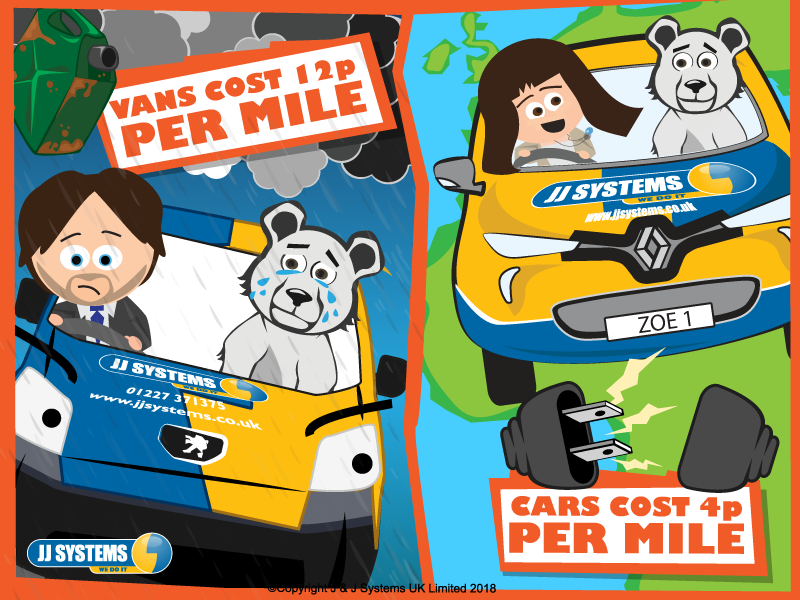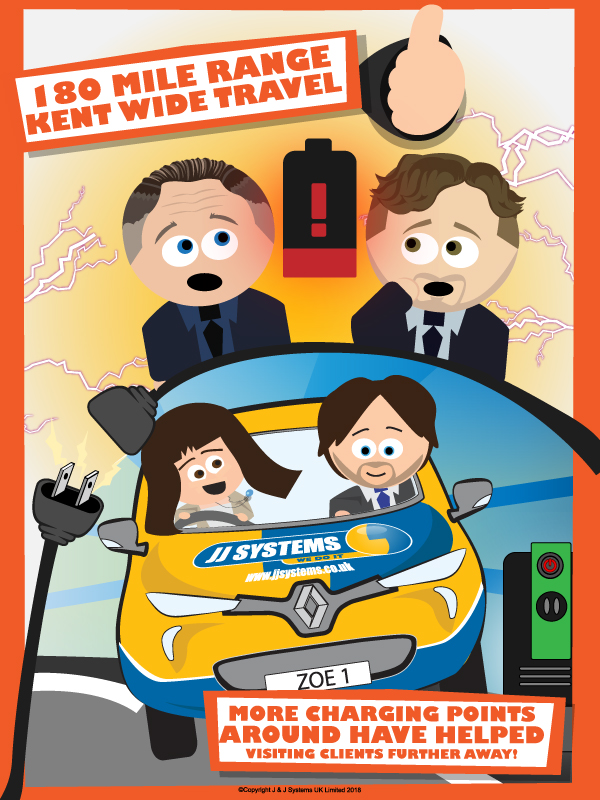Electric Vehicles – Four Years Later
Going into business with EV Vehicles
Four years ago, we made the decision to continue our green initiatives and invest in electric vehicles when replacing our diesel vans as they aged.
Our first two electric vehicles were ordered, after some investigation in December 2017, arriving in May 2018.
We chose to purchase the vehicles, including batteries outright, reviewing the costs this seemed the most sensible route for our business and in line with our normal vehicle purchase policy.
Tesla VS Renault Zoe
We had reviewed the vehicles on the market & decided that the famed Teslas were out of our price bracket, opting for the smaller, more economical Renault Zoe which was approximately double the investment of the diesel vans, considering that VAT is not reclaimable. The Dynamique model then had a published range of 180 miles per charge, when running in Eco, which would, in the main suit most engineer journeys within the Kent area on a daily basis. Newer models can now extend to over 230 miles per charge.
EV Charging Challenges
Back in 2018, the arrangement for installing charging points were included with the vehicle, but it was a little confusing, so we opted to install an additional fast charge point ourselves, which gave us both options for the cars, along with installation of the chargers for each staff member who would drive one of the vehicles. The cost of installation was minimal when considering the convenience of being able to charge at home. Charging point installation is now an everyday occurrence and as the charging infrastructure improves, finding charging points whilst en-route, no longer means finding a Lidl car park, or a motorway service station.
Range Anxiety – Should we be worried?
The cars themselves, certainly are pleasant to drive and over three years later, we have a further two Renault Zoes added to our fleet, with plans to add more in the future, but along with the good bits, there are one or two down sides. I for one find I do enjoy driving the car, perhaps Im older and an automatic, with a few gadgets is more pleasant, but there is no escaping a degree of ‘range anxiety’. I am still not brave enough to take it as far as Gatwick & find a charger en-route, but on a day to day basis I am comfortable with Kent trips and remembering to charge up keeping enough in my electric tank to get to a hospital, or at least back to the office for a ‘fast charge’.
Value for money – What are the running costs?
The first thing anyone getting in an electric car will notice is the lack of noise, the second thing is the lack of needing to fill up with fuel at the garage. I still love the fact I don’t have to visit a garage. The reduction in fuel costs is noticeable, with the cost for electricity for the cars being about 4p per mile, including VAT, where the vans were costing roughly 12p per mile including VAT.

The running costs of the cars has proven very low for their first three years of life. On average the cars are travelling about 10k miles per year, needing a basic ‘service’ annually. We initially used the main dealer for these checks as they were the only garage able to provide the service, but our local garage is now qualified to manage these and prove even more cost effective.
Practicalities – Work VS Home
Personally, I tend to drive down rural roads & have experienced above average number of punctures since using the Zoe’s in the last three years, compared to the tyres in my van usage over the previous 10 years, I can’t find any evidence to suggest this is an EV issue, more likely a driver issue!
Have we saved at all – costs was it worth it?
The average cost of a Zoe ‘service’ which includes filter replacements, from our local garage is around £80 including VAT (2021) compared to the original 2019 figure of £99 including VAT. This compares favourably to a standard service of a fleet diesel van which, including filters & labour was £200 (2021).
Though a rough investigation, it’s clear to us that the cost of running the cars is about half that of the vans. On average if a car travels 10k miles per annum, that would save £800 per year on fuel, adding in the saving of £100 per service, per year compared to running a diesel van, in three years we have saved £2700 per vehicle and in 5 years we would have more than repaid the additional investment of a vehicle & been covered by a warranty life for the battery of 100,000 miles or 5 years. Our staff who permanently hold EVs have of course benefited from the reduction in company car tax which has made a noticeable difference to their net pay vs the diesel vans.
EV – Is it the future?
Overall, the driving experience, efficiency and costs mean that as a business we will continue to invest in electric vehicles as part of our commitment to clean air & reduction in emissions as a business, which is actually not costing us any more. The business continues to invest in saving polar bears, with the installation of a solar array on the roof of our unit with the help of a KCC LoCase grant and our recycling of old equipment with a local Maidstone charity, these along with our commitment to recycling all the packaging in the business and removing packaging from clients sites to help them with disposal show our continued desire to keep emissions low and air clean.












